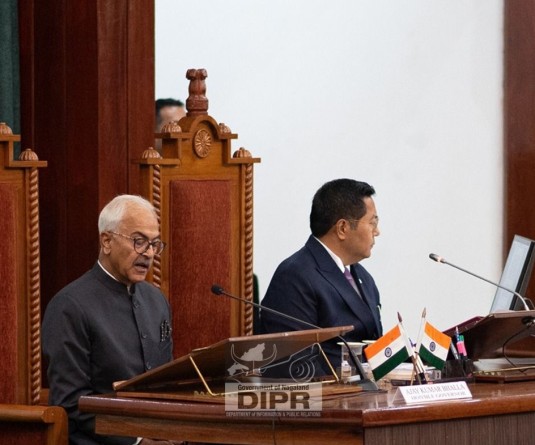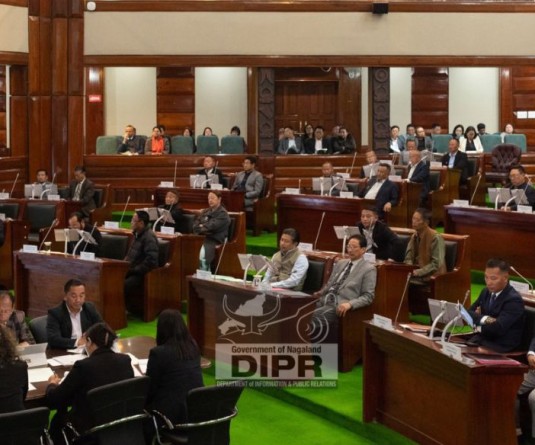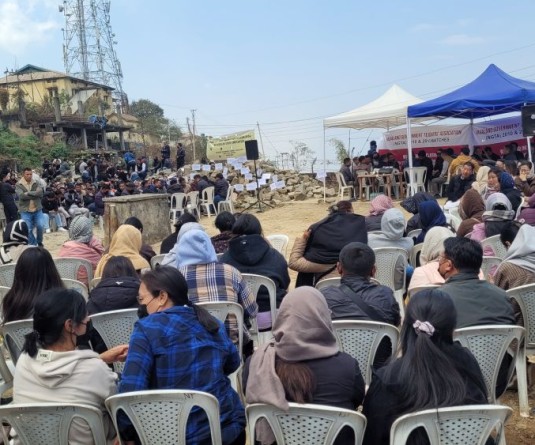
‘The remedy which experts see is for the groups to unite so they can hold accountable one particular group for the tax paid’
Sidrah Fatma Ahmed
Dimapur | June 14
When we draw into the Naga collective memory of the age-old practice of Tax collection, we reach the close relationship it bore with the Naga Independence Movement. Using “tax” as a word for then is not justifiable as most that remember those times insist to call it “contributions”. The leap of word quickly changes the meaning of the practice from one that is compulsive on the people to one that the people are happy to pay. It will be hard to say when the practice of obligatory contribution started exactly, but one can easily say it holds historical and emotional value to every Naga and their movement.
The period 1953 to 1964 was one that saw active hostilities between the Naga Guerrilla and the Indian Government. As fashion, from every 10 Naga household one able member joined the Guerilla Organization. In its true spirit, the organization was one run by the people, for the people and of the people.
Back then the Naga guerrilla organization was a loosely knit conglomerate of regional and tribal guerilla bands acknowledging their authority to the Naga Federal Government. To keep the organization that consisted of friends and family, fed and strong, contributions of rice, paddy, poultry, buffalo and sometimes cash were made from time to time by the people. The cash was used to buy arms and ammunitions to refurbish the guerrillas. In this sense, the personal interest that every Naga took in the upkeep of the organization was symbolic of their support for their movement. A movement, clearly very close to their heart.
Puni Modoli, Former President of the United Naga Council, with an instance from the past brings us closer to the goodwill of the bygone days. His family lost the bread earner, their father very early. A mother and 5 children in the family offered a contribution of little paddy to the guerilla organization. The brigadier sensing their plight refused to take the contribution. Instead, he suggested the children be fed the paddy so they shall grow up to be strong Nagas. That was the spirit of brotherhood, one that foresaw the future of Nagas as a collective.
The important question now is where does the practice that started in goodwill in the bygone days stand now? Can Nagas gallantly boast of such humane stories after passed decades?
In the present scenario Nagas are paying tax on many folds. Firstly, they pay a household tax yearly. It is estimated to be Rs.110 every year. Depending on how many groups they pay to, the amount stands multiplied. Secondly, goods entering Dimapur are taxed on many stops until they reach the market. On the border where the goods enter, in the warehouse it is stored and finally in the shops where it is sold. Of which, the consumer finally pays the brunt. Moreover, Nagas pay a 24-25% of their salary as yearly tax. What does not finish here is more worrying, even grants for development projects are taxed from the village development boards.
In the current situation, Nagas pay a surprising amount of tax to the National workers and their factions. We realize how far apart the practice has gone from what it used to be to what it is now.
The problem arose when the Naga political groups started splitting into different factions. Currently estimated there are six factions. Neingulo Krome, member of the NPMHR, points out that after these splits happened, every group collected tax. In a bid, to show territorial control but also to show political legitimacy. It became a competitive show. Until they collected tax it meant the movement was still alive and budding and they were active members of it.
What later arose and is being experienced by the Naga community now is an even more de-generate practice of Tax collection. One that is called extortion and is practiced by impostors. They may be drug addicts or unemployed youth owing no linkages to the factions at all. The brunt of a rented gun pointed at a common man, quickly gets their pockets empty. The statement, what can we do in front of a gun, is one heard far too often in Nagaland. The common sight of grills guarding general stores in Dimapur speaks volumes of the insecurity the citizenry faces here.
Another pit fall that the Naga community complains about is that the current tax system is not a planned one. Sometimes, the collectors may be junior faction leaders and the tax they collect might not be held accountable to anyone. Therefore, finally going into their pockets. Joel Kath, Financial Secretary to The Naga Council points out that due to unemployment in the state, taking jobs with the factions is a pleasant career prospect for the youth. It’s the start of a very vicious cycle.
An unemployed Naga youth joins the faction only to fill his pockets on the mercy of his own people. Therefore, in Nagaland, one problem is feeding the mouth of the other finally creating bigger ones.
The reluctance of the Indian Government to reach a political resolution on the Naga issue is a contentious player in the escalation of the tax problem. The undergrounds will claim existence unless the issue is not solved. Accordingly it seems like a ploy by the Indian Government to push the community to decay where they cut their own throats. And, that is exactly what is happening in Nagaland.
It is only obvious then, that the system of unabated taxation is acting as the fire creating bubbles of frustration amongst the community. Since, last year The Naga Council, Dimapur has been raising a voice against extortive taxation, repeatedly asking the government to curb it down. The matter died down last time, as there was no fuel provided by the state government. The Naga Council says, as an NGO it’s their responsibility to address the grievances of the people. When people complain to them that in the neighboring state of Assam a kg of chicken is worth Rs.75 but in Nagaland its Rs.200, they know it’s time to act.
This year, the Action Committee Against Unabated Taxation (ACAUT) supported by mass based civil society bodies and public organizations is spearheading the issue again. The Nagas are finally taking a collective stand towards a practice that is well on its way to paralyze their people and their economy.
Mhacio Lotha, President of the Dimapur Naga Students Union, looks at the effect of this practice through retrospection and introspection together. He explains that at a point of time Dimapur was the fastest growing city in Asia but at the current rate of inflation the city will be left stagnant. There will be no growth. The result of Nagas keeping their heads together will result in the city staying together.
The matter finally holds ground when one wonders where the exorbitant amount of money collected is being used? Many people are raising this question of late. Mr. Sanjoy Hazarika, A senior Journalist wrote in the Sunday Guardian. “ In the NE, most of the underground groups employ a taxation system that is at times not just unfair but usurious for they give nothing in return, in terms of basic services like water, electricity, roads, barring ensuring that the person paying or his family does not get harmed or targeted by their group in some way. There is no guarantee of that either”.
Amongst all this what is most important to understand is that the Naga’s are not against paying tax nor are they against these factions. After all, paying tax is symbolic to their support for the movement and the existence of these National workers and their faction is a testimony that their cause is still being fought for. They are just tired of paying taxes through their teeth. The remedy which experts see is for the groups to unite so they can hold accountable one particular group for the tax paid. After all, against all denied rights, the right to know where their hard and sweat earned money is going is only one justified.
This unchecked practice has not furthered the movement but only resulted in the poor getting poorer and a selected few getting rich. While “contributions” in the past was given to strengthen a Naga and their movement. The practice of unabated “tax” is an indirect push towards weakening both.






